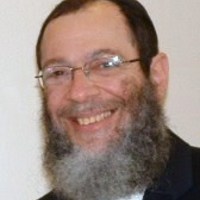When I was in elementary school, we knew that somebody being faster than a
speeding bullet, more powerful than a locomotive and able to leap tall buildings in a
single bound was science fiction. What passed for science fact was even stranger:
you could survive an atomic bomb attack by standing in the school corridor, up
against a locker with your hands behind your head. Thatâs why we practiced doing
it in during air raid drills. It was surreal, and a little scary.
I was in junior high school when the Cuban missile crisis made the threat of nuclear
war frighteningly real. I remember having long talks with my parents, aâleihem
hashalom, during which they assured me that we would be okay. I was eleven
years old, and I believed them because they never lied to me.
I spent the summer of 1966 with my aunt, uncle, and cousins in Netanya. Less
than a year later, when I listened to the news of bombs landing in Israel, Hashem
yishmor, I was terrified for them. Baruch Hashem, none of them was hurt.
But we, and our children, have heard about people being hurt. We, and they,
remember the loss of a yeshiva child at the hands of adult from our own
community, the murder of a yeshiva teacher by her husband, and the tragedies
that have taken place in public schools. We and they feel deeply saddened by
what happened to them, and frightened by it.
What are you supposed to say to your child when he is scared? How do you make
sense out of something that is senseless, explain the inexplicable, and assure your
child that something that should never have happened will never happen again?
Those were the questions on the mind of a mother of an eight year old who called
me the day that her childâs school was shocked by the news that a teacher had
been murdered by her husband. Even though her child had never been in this
teacherâs class, her child knew this woman and was deeply shaken by what had
happened. Raizy said she had told her daughter that they would talk about it later,
and that Chani shouldnât worry that anything bad could happen to anyone else in
her school.
But something very bad had happened, and I donât know how to explain it to her.
What should I tell her? She has, unfortunately, heard about terrible things before,
but Iâve always been able to say to her that what happened there could never
happen here. This struck awfully close to home and I donât know what to say to
her. How much should I tell her about what really happened and what theyâre
saying might have been the reason?
I began by making it very clear that thereâs no reason that could possibly make
sense out of or justify what had happened. Then, as is my wont, I asked her a
question.
Raizy, how have you explained this to yourself? How have you made sense out of
what happened and been able to go on with your life so far?
Raizy: Itâs totally senseless, and at first I guess I didnât go on with anything. I was
driving home from seeing one of the children I work with, and I was half listening
to the news on the radio when they said the name of my daughterâs school. Even
though nothing had happened at the school, Baruch Hashem, I was scared about
what would happen when my daughter found out I remember starting to cry but
deciding that I needed to get home and as soon as I got home I called my husband
and told him what had happened and he helped me calm down but when Chani
came home I didnât know what to tell her, so I told her weâd talk with her later.
Me: And since you said that to her, what have you been doing?
Raizy: What do you mean what have I been doing? I havenât been doing anything,
I called you to find out what to do.
Me: Yes, and Iâm sorry that it took me over an hour to return your call. What have
you been doing in the meantime?
Raizy: I prepared supper and served it and we ate, very quietly.
Me: What you did, Raizy, is you went on with your life to the best of your ability
even though you were very shaken by what had happened and very concerned
about what to say to your daughter. You showed her that life goes on even when
youâre scared and unsure. The next thing to do before you tell Chani anything, is
to ask her what happened. Donât assume that she knows what you know; donât
assume anything. When she tells you her understanding of what happened, and
tell her that you think what happened was terribly sad that you hope such a thing
will never happen again. Then ask her to tell you what she thinks about what
happened and what she wishes you could say or do to help her.
If she wishes for reassurance, give it to her. We trust Hashem to shield and protect
us and we doven and do teshuva to bring zchus for ourselves and others.
The Chofetz Chaim, when told of a flood in Mississippi that claimed many lives,
said, âIf hashgacha pratis has caused us to hear of this disaster here in Radin then
we must do teshuvah.â The Chofetz Chaim responded in a similar vein after hearing
that Mount Fuji had erupted in Japan, causing widespread destruction (Kol Kisvei
Chofetz Chaim, vol. 3, Michtavim 10, 12, 30, 40). May we, in his zchus and our
own, share bâsoros tovos.
Rabbi Yitzchak Shmuel Ackerman is a Licensed Mental Health Counselor with
specialties in marriage, relationships, and parenting. He works with parents and
educators, and conducts parenting seminars for shuls and organizations. He can be
reached at 718-344-6575.

 Previous
Previous

